#bipoc voters
Text
AN OPEN LETTER to THE PRESIDENT & U.S. CONGRESS; STATE GOVERNORS & LEGISLATURES
Implement Ranked-Choice Voting & Election Reforms For Vote Integrity
3 so far! Help us get to 5 signers!
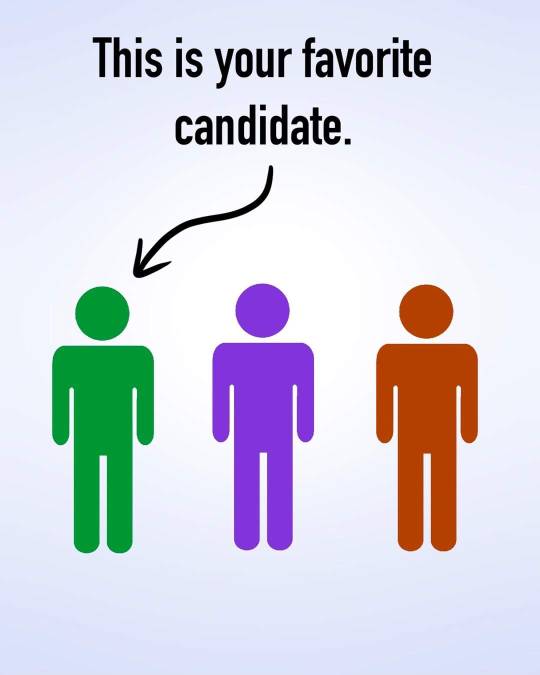


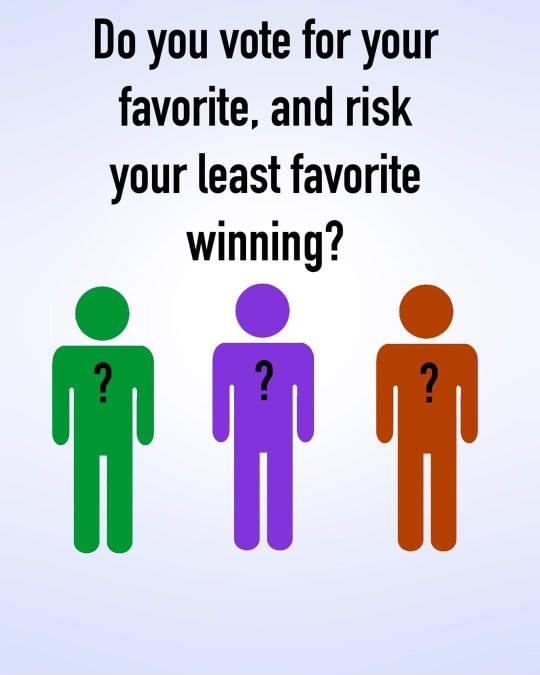
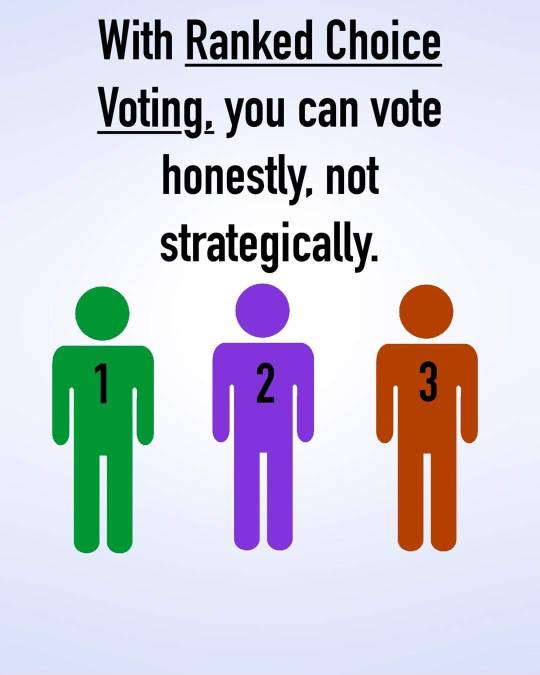
I am writing to urge your immediate action on introducing and passing ranked-choice voting (RCV) and other vital election reforms at both the federal and state levels. As a concerned constituent and advocate for democratic principles, I believe that these reforms are essential to improving our electoral processes and ensuring fair and representative governance.
Ranked-choice voting has proven effective in promoting democratic outcomes by enabling voters to express their preferences more fully and ensuring that elected candidates enjoy broad support from the electorate. RCV mitigates wasted votes, reduces the spoiler effect, and fosters more inclusive and issue-focused campaigns.
In addition to advocating for ranked-choice voting, I strongly support comprehensive election reforms, including campaign finance reform, gerrymandering reform, and initiatives to enhance voter access and participation. These reforms are critical to strengthening our democracy and restoring trust in our electoral system.
The implementation of Ranked-Choice Voting is a crucial step towards enhancing our democratic process. RCV, which allows voters to rank candidates in order of preference, ensures that elected officials have majority support, eliminates the spoiler effect, and encourages positive campaigning. This system is already in use in several U.S. cities and countries like Australia, Ireland, and New Zealand. Alaska recently became the second state to adopt RCV for statewide offices, following Maine's lead. It is time to consider this reform at both federal and state levels to ensure our electoral systems reflect the diversity of our nation and empower all voices. Therefore, I urge you to introduce and support legislation that promotes RCV and other election reforms.
We must recognize that Americans are more than a two-party system. Let's take meaningful steps to ensure our electoral systems reflect the diversity of our nation and empower all voices.
Thank you for considering my perspective and taking decisive action to improve our electoral processes. I stand ready to support your efforts in advancing these important reforms.
📱 Text SIGN PMZPRT to 50409
🤯 Liked it? Text FOLLOW IVYPETITIONS to 50409
#tell your representatives you want Ranked Choice Voting now!#no vote is wasted if you use rank voting#democratic party 2024#democratic party#democrats#third party#third party politics#green party#libertarian#libertarian party#undeclared#undecided#independent#independent politics#vote#vote the whole ballot#vote every time#voter suppression is violence#voter drive#voter education#register to vote#your vote matters#intersectional social justice#us politics#politics#queer voters#lgbtq voters#black voters#bipoc voters#latine voters
3 notes
·
View notes
Text
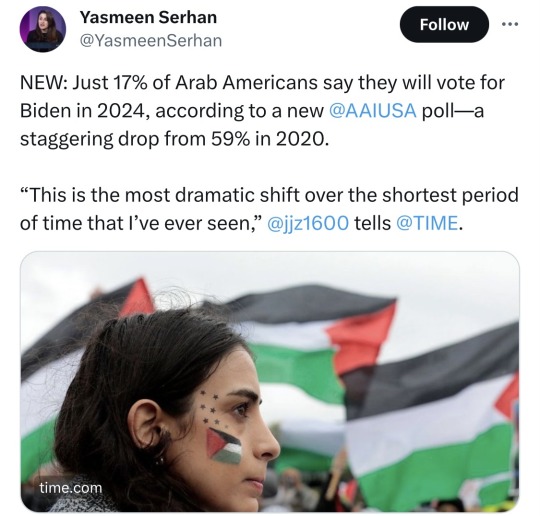
On November 2024 they’re gonna cry about what went wrong and why did people stay home and refuse to vote and they’re gonna blame it on BIPOC like clockwork!!
#palestine#free palestine#the Dems aren’t doing shit to save Florida#but they want to gamble with BIPOC voters#hilarious!!#I’m just sick of people refusing to acknowledge it too#you cannot tell me people are happy with biden right now#diverting the attention to someone ‘good’ biden has done isn’t gonna work#something*
27 notes
·
View notes
Text
Available in English and Spanish, AWN's Guide to Voting has specific resources for disabled voters, BIPOC voters, voters in the South, trans/nonbinary voters, and more. Check it out!
30 notes
·
View notes
Text

Posted 13 hours ago.
Israel is using the two-day extended "truce" to step up the ethnic cleansing of West Bank. They're also abducting as many Palestinians as they're releasing, including women and children.
I need you to keep reblogging and boosting these. We need to keep the unfolding US-backed terrorism visible and current throughout because your governments are depending on their constituents getting tired and giving up. If Palestinians have to live the unending nightmare your money and your votes are being used for, then the least you can do is make sure they're seen. Even now the "don't divide the Dem voters" Zionist psy op is working to sabotage the visibility of pro-Palestine posts on this site. If you lose interest, they will step up their harrassment of Palestinians, Arabs, Muslims and BIPOC. Don't let them normalize genocide!
#west bank#war crimes#gaza genocide#palestinian genocide#free palestine#israel is committing genocide#israel is a terrorist state#knee of huss
41 notes
·
View notes
Text
Dismissing third party and non-voters as "Russian bots" or whatever is just another way liberals try to make excuses to ignore very real people (bipoc in particular) and our concerns about this corrupt system. It's extremely racist and shows how little liberals know and understand and how much they need to look deeper into how those in power are actually the ones manipulating you into thinking you have no other choices but blue or red.
#free palestine#free gaza#ceasefire#gaza strip#palestine#abandon biden#gaza genocide#gaza#rafah#uncommitted#third party#genocide joe#joe biden#donald trump
40 notes
·
View notes
Text
Willkommen and bienvenue to another round of anonymous Tony voters debating the merits of this year’s nominations, with Stereophonic and Hell’s Kitchen leading the marquees with 13 nominations each. Despite all the mothers, rock-and-roll doyens, and Waystar Royco employees trying to lure us to the Theater District, our two veteran Tony voters aren’t overly enthralled by the season. They think it’s one of the strongest years for plays in recent memory. But for musicals? Eh, maybe some shouldn’t have made the transfer from across the pond. And while Stereophonic and Merrily We Roll Along are destined for further greatness, the voters don’t think being a Hollywood star guarantees an acting trophy. Ahead of the June 16 ceremony at Lincoln Center, they weighed in on where they stand and why.
Best Performance by a Leading Actor in a Musical
Brody Grant — The Outsiders
Jonathan Groff — Merrily We Roll Along
Dorian Harewood — The Notebook
Brian d’Arcy James — Days of Wine and Roses
Eddie Redmayne — Cabaret at the Kit Kat Club
Voter 1: There are three exceptional performances in this category. Brody and Brian are extraordinary, but my vote is going to Jonathan. His performance is the best of the year in any category, actually. He manages to make, on paper, a character who might be very unlikable and turn him into a complex human being who makes some pretty awful choices, and yet we understand the humanity behind those choices. It’s a staggering achievement.
Voter 2: My winner is Jonathan. That character is a total jerk the way it’s written, but he makes him completely sympathetic and it’s a beautiful performance. But I do want to say it’s an interesting list of names. I would’ve put money on Brian because that was an amazing performance. I probably would’ve predicted Eddie, even though it was a very divisive performance. I thought it was very stylized. I thought, Okay, you know what? That’s a choice. He was just sort of there for me, but I suspected he would get nominated because it’s one of “those” roles. Brody is saddled with two of the worst wigs on Broadway — he overcame them. The one glaring omission here is the star of Tommy, Ali Louis Bourzgui. That kid is a star. He’s so magnetic. I was enraptured from start to finish and I don’t understand why he’s not included.
Best Revival of a Musical
Cabaret at the Kit Kat Club
Gutenberg! The Musical
Merrily We Roll Along
The Who’s Tommy
Voter 1: Merrily, Merrily, Merrily. I do think it’s disappointing that the one specifically BIPOC musical, The Wiz, was excluded. I’ll say that. I’m disappointed that it was snubbed. But for me, it’s Merrily in a walk. I really liked it downtown and I fucking loved it uptown.
Voter 2: Merrily. It’s always been my favorite. I know it’s the Stephen Sondheim black sheep show, but this is the best production I’ve ever seen and I think it’s the best production you will ever see. It finally works. There’s a lot of good you can say about these four shows, but Merrily is without question the one for me.
Best Performance by a Featured Actor in a Musical
Roger Bart — Back to the Future
Joshua Boone — The Outsiders
Brandon Victor Dixon — Hell’s Kitchen
Sky Lakota-Lynch — The Outsiders
Daniel Radcliffe — Merrily We Roll Along
Steven Skybell — Cabaret at the Kit Kat Club
Voter 1: This is another great category. I loved Steven and really loved Brandon. I thought both of the guys from The Outsiders were wonderful, but I’m all about Daniel. His delivery of “Franklin Shepard, Inc.” is award-worthy just for that song. Watching him grow as a stage actor has been a privilege. He’s one of the biggest stars in the world and he keeps coming back to the stage. In this production, he just takes it all to another level. It’s spectacular.
Voter 2: I’ll end up going with Daniel, but Steven, oh my God. I’m thinking about his performance and I’m almost crying again. Ron Rifkin won for that role in the last Cabaret revival. It’s definitely one of those roles that gets you noticed. But Tony nominators have had a habit of ignoring Daniel, so I was so happy they nominated him. He’s a fantastic stage actor. This isn’t a brag, but I’ve seen everything he’s done in New York on and off Broadway, and he gets better every time. His “Franklin Shepard, Inc.”? He’s singing the 11 o’clock number at 8:30. Come on. That’s a pretty tall order. Oh, I totally forgot about Back to the Future. I’m surprised Roger got in there.
Best Performance by a Featured Actress in a Musical
Shoshana Bean — Hell’s Kitchen
Amber Iman — Lempicka
Nikki M. James — Suffs
Leslie Rodriguez Kritzer — Monty Python’s Spamalot
Kecia Lewis — Hell’s Kitchen
Lindsay Mendez — Merrily We Roll Along
Bebe Neuwirth — Cabaret at the Kit Kat Club
Voter 1: You won’t be surprised given all my Merrily love, but it’s Lindsay. She recently got married — Jonathan was the officiant and Daniel was the ring bearer. That’s how close they’ve become as friends, and that chemistry and love they have for one another is so evident onstage. Lindsay is really funny and sour; she oozes sarcasm, and yet she allows us to see the pain behind all the armor. In the final Merrily scene, we witness her innocence and her hopefulness in a way that I don’t think anyone sees coming. It’s acting at the highest level.
Voter 2: Even though I love Merrily and Lindsay here, I’m inclined to vote for Kecia for Hell’s Kitchen. I didn’t love the show, but she was one of the reasons I liked it. Oh my gosh, her voice. She anchors the show in a lot of ways. She’s also one of those actors who’s always been around and doing fantastic work. She made her Broadway debut at age 18 in Dreamgirls, playing Effie. This show is just another reminder of her talents. It’s not like we should give Tonys for longevity or lifetime achievement, but I feel like this is just another reminder of, Yes, Kecia is fantastic. That might put me over the top for her.
13 notes
·
View notes
Text
Here's are the risks YOU PERSONALLY are imposing on every queer, bipoc, and disabled person in the US if you refuse to vote in the elections
The criminalization of trans and nonbinary people
A nationwide repeal of gay marriage rights
The complete gutting or possibly dissolution of the Environmental Protection Agencies and most of its policies
The removal of laws preventing price-gouging on life-saving medications
The deportation of nearly every undocumented immigrant in the country
The defunding of most public libraries, museums, community centers, parks, nursing centers, and transporation
Increasing suppression of the rights of non-christians
Increasing militarization of the police
A widespread increase of voter suppression
The loss of nearly one-third of the senate to republicans
The loss of the majority of the house of representatives to republicans
The replacement of aging supreme court justices with republicans who will retain their positions for the next 30-40 years
In short:
VOTE YOU FUCKING DUMBASS!
17 notes
·
View notes
Text
Forward: This post isn't meant judgmentally, targeted at anyone in particular or as a gotcha and I write in entirely good faith.
A question I have for white folks in particular (but also abled people, cis people, etc, but also everyone in general who votes) when engaging with electoral politics is, are you taking measures to protect the rest of us from your candidates? There's no perfect candidate for sure, but that means people will be hurt, and as voters we have a responsibility to call out and prevent harm that our candidates do; if we aren't then we're directly complicit in that harm. Are you willing to put your bodies and minds on the line to protect those who aren't going to be protected by those candidates? Because of the nature of US politics, our own candidates need to be challenged just as fiercely as if someone else got elected.
Again, I'm not against voting at all! I literally vote blue every time and in every election. I think there's strategic value in it, but we have to actually strategize, which hasn't been getting done. Are we actually engaging with why people are hesitant to vote? People use the "you're damaging your own cause!" whenever people seen as "scary leftists" participate in their actions, but it's never applies to liberal and electoral politics even though the same can be said. Trying to harp on and guilt people into voting when without engaging with why that is just damages the cause and pushes them further away. Also note that the majority of people critical of the way electoral politics are done are BIPOC; this is important to think about.
The democrats are objectively better for more people than the republicans, but there are people who are destitute to the point where those two parties are the same. Palestinians for example! Democrats also fund police measure against homeless folks as we see in the PNW, which is strongly blue. Indigenous people here are another similar group– the way indigeneity is legislated here, they're literally programmed to eventually go extinct from a legal standpoint due to the colonial law of blood quantum. Not to mention that reservations are literally, in their words, concentration camps.
Are you going to make things better for yourself and leave others to fall through the cracks? Or are you going to use that to lift everyone else up? This traditionally hasn't been the case, so if you want BIPOC voters to trust you, you have to demonstrate that you won't get attached to you candidates and hold them on a pedestal.
How are you going to assuage fears when people get anxious (and they will!) without also invalidating their fears (which is common under electoral politics votes). Can you do this without a lot of the manipulative tactics a lot of outlets use? (Blaming disaffected BIPOC for when things go wrong, using the "well the other guy is worse!" line.) Folks ask for 1000 step plans when talking about non-electoral political elements, but when engaging with electoral politics people treat it like magic, and if anyone falls through the cracks and complains, they're just being cantankerous. This is only a small percentage of the things that need to be considered.
Election season is also really retraumatizing for folks who have colonized backgrounds. Are you making sure we feel safe? Are we being thought about as real people, instead of just abstracts or as a resource to generate votes, but who are just being obstinate? (As opposed to again, real people with real motivations)
As a final note, people also comment on "Why abstain anyways when you know it's going to be bad either way?" for particularly marginalized people, and I think the answer (folks in those situations can correct me here) is that it's more cathartic to watch the people who let you slip through the cracks fall with you, than slipping through the cracks and watching those same people have brunch and pretend you and your problems don't exist. It's like being trapped in a room with only crumbs to eat while the people on the other side of the door throw a dinner party, and if you complain, yell at you saying that the other guys wouldn't even give you crumbs.
#Ad nauseum mention that I vote blue every time#I'm just the messenger here so direct any angry words at the people running electoral campaigns#Being upset isn't going to change anything#us politics#Sorry if this is jumbled I threw this together in a shabbat half-asleep fugue
23 notes
·
View notes
Text
if you're in the us and you're as terrified as i am about trump running again but aren't sure what to do, i'd love to suggest writing letters for vote forward.
i've written letters for them for several years. we send handwritten nonpartisan letters encouraging people to vote. the more people vote, the more people vote blue. the more disenfranchised voters vote, the more people vote blue. the more bipoc folks, queer folks, women, single parents, low income folks, etc vote, the better off we will all be.
take a break from doomscrolling. ranting on twitter or tumblr won't change people's minds.
make a donation to a candidate in a swing state. write letters to encourage people to vote. volunteer with a local organization making an actual difference on an issue you care about.
it's not hopeless, but you can't do everything all at once. pick something you can actually do, and start there. once that's done, maybe you can do something else.
i just signed up to write five letters to support voter turnout in michigan. once i get those prepped, i'll sign up to write some more.
#grace rambles#vote forward#when i start to panic i sign up for a few more letters#or make a small donation#the right wants you to be panicked#to think it's hopeless#it isn't#but screaming on the internet isn't the solution#you are capable of making a difference#but you gotta be realistic about scope#take on something small and manageable#and then go from there <3
12 notes
·
View notes
Text
Everyone in America:
If you are not registered to vote, check to see if you are eligible. If you are eligible, do everything you can to get registered before the deadline in your state.
If you are already registered, double-check your registration online. In 2020, there were stories circulating of people becoming "unregistered." True or not, make certain that has not happened to you.
If you can't vote, do everything you can to convince others to vote. Boost the signal about the issues at stake. Don't be quiet. Urge people to vote. If you can help them register or get to the polls, even better.
Continue protesting for human and voting rights in any way you can. If protests die down, it signals to people that the status quo has been accepted as normal. It tells people who believe in human rights that they are alone in their rage. It lets politicians ignore the angry letters and demands for change.
On Election Day, get to the polls to vote. I know this sounds simplistic. I know this is easier said than done for some people. I wish I had an easy solution to all the barriers that might arise, but I don't.
This may be the most influential election we've ever seen. Voting rights, LGBTQIA+ rights, BIPOC rights, prisoner's rights, and women's rights are all at risk now. Everytime I say something like this, I get replies saying "Everyone already knows," but they don't. I still hear people saying not to be worried, the worst rarely happens, etc. So don't assume people have put the puzzle peices together. Make sure everyone knows the cost of not gaining the majority this midterm.
If we can get an overwhelming majority of Blue or liberal congress people in both the House and the Senate, we may be able to start reversing the damage the SCOTUS and the Republicans have done. But if we don't...it's going to be a much longer road.
71 notes
·
View notes
Text
AN OPEN LETTER to THE PRESIDENT & U.S. CONGRESS; STATE GOVERNORS & LEGISLATURES
Stand Against Voter Disenfranchisement: Keep Voting Age Fair!
1 so far! Help us get to 5 signers!
I am writing to express my strong opposition to any efforts to increase the voting age to 21 or older. Recent proposals by some Republicans to raise the voting age are deeply concerning and would unjustly infringe upon the civic duties of legal adults.
It is important to remember that many of our nation's founding fathers, including James Monroe at 18, Aaron Burr at 20, Alexander Hamilton at 21, James Madison at 25, and more, were all young adults when they played pivotal roles in shaping our country. Denying young adults their right to participate in our democracy would contradict the very principles upon which our nation was founded. Would you have prevented these American legends knowing they were capable of greatness?
The notion that if someone is "old enough to fight, they are old enough to vote" holds true today. Young adults contribute to society in meaningful ways and deserve to have a say in the decisions that impact their lives and their futures. If 18-year-olds are fighting and dying for you, you must listen to their voices!
Furthermore, restricting voting rights disproportionately affects already disadvantaged minority voters. We should be working to include and strengthen our populace, including BIPOC Americans, reformed citizens seeking reintegration into society, and our extremely motivated youth. We must work to strengthen voting access for all American citizens, not limit it.
In the words of our American colonials who fought against their British rulers, "Taxation without representation is tyranny." Denying young adult Americans their right to vote would undermine the core principles of our democracy that we have held since day one.
I urge you to oppose any measures that seek to raise the voting age and instead support efforts to protect and expand voting rights for all eligible citizens.
Thank you for considering my perspective on this critical issue.
📱 Text SIGN PVTGSX to 50409
🤯 Liked it? Text FOLLOW IVYPETITIONS to 50409
💘 Q'u lach' shughu deshni da.
🏹 "What I say is true" in Dena'ina Qenaga
#IVYPETITIONS#PVTGSX#resistbot#open letter#U.S. PRESIDENT#U.S. CONGRESS#STATE GOVERNORS#state LEGISLATURES#Voter Disenfranchisement#Voting Age#James Monroe#Aaron Burr#Alexander Hamilton#James Madison#📱 Text SIGN PIYDKC to 50409#Founding Fathers#American History#Political Engagement#Minority Voters#BIPOC Americans#Civil Rights#Representation#Social Justice#Equality#Government#Political Participation#Youth Vote#Citizenship#Democratic Principles#Election Reform
5 notes
·
View notes
Text
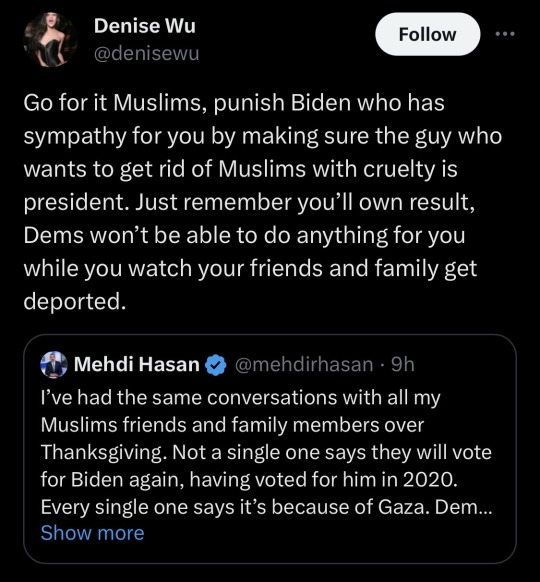
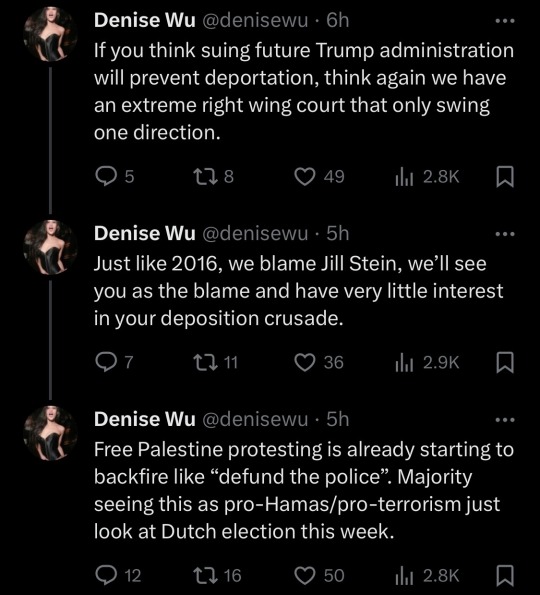
I told y’all. I told y’all and they’re already starting.
The last tweet is the most sinister of them all. Now we’re too much. We’re too demanding. Our messaging isn’t right. We’re stupid for even supporting it.
BIPOC voters are not to blame if biden loses the election. I rebuke!! I refuse to let this be the narrative!! Muslim/Arab voters (and any other BIPOC voters) do not owe you their vote!! Prove to them that you are worthy of their vote!!
15 notes
·
View notes
Note
I understand the shock of baftas but they've always favoured british films or films made by british directors. They've also been guilty of uplifting and prioritizing white actors over BIPOC, so I came away less shocked. While JE didnt deserve a nom in my opinion I see why they highlighted him simply b/c they liked saltburn over may/december and poor things. The voter seemed to have favoured that film along with all of us strangers. This explains why mark ruffalo, melton, moore, portman, dafoe were snubbed. While rosmund pike, barry and elordi were picked. Awards arent an accurate indicator of who delivered the best performance, it more about politics, who has the votes ( voters judge performance based on their own preferences which could factor in a number of things) while bafta needs some changes b/c it heavily skews toward white brits, it isnt that surprising.
Still happy for colman, fantasia, tee yo, vivian oparah, davine joy randolph they were all excellent a deserve their praise. I dont want to focus too much on what they got wrong b/c it was alot ( hello where is lily gladstone) . Im here to celebrate the ones they got right and the ones that were unexepcted like vivian oparah and tee yo.
Thanks Anon.
You know, speaking of TCP.... I'm a little saddened that it seems as though this film will get snubbed (yet AGAIN) this year at the Oscars. So far, nobody has really won any big heavy-hitting awards in the cast. And the film is almost treated like it wasn't a masterpiece.
I expected it to at least get something from the Golden Globes... But NOPE!
I don't expect much from the Oscars tbh. It will be snubbed ONCE again by the Academy smh. 😓
I just know good and well that had this been a story where all of the characters were white, the film would have long-since won some Academy Awards the first time around. Just my thought...
2 notes
·
View notes
Text
"i know both presidential candidates support genocide, but we still need to vote-" ENOUGH. y'all always emphasize the right to vote, but your civic duty literally starts and ends with voting. if you say you're going to vote for someone regardless of what they do, even if you oppose a majority of their policies, how effective is your vote? how are you utilizing the power of your vote to pressure change?
i've seen so many posts saying we have to think about lgbtq+ people, women, bipoc, immigrants, and disabled people this election since it's not just the palestinian genocide that's on the ballot and i just wished y'all would just admit that you're racist. that you would just end this facade of caring for palestinians when you actually believe the livelihoods of americans are more important. genocide should be the red line for everyone, it is quite possibly the worst thing that could happen to a group of people, and yet you're finding ways to minimize it bc it could affect an election that is already steeped in fascism.
you say we have to talk to these minority groups to understand the dangers of a trump win, but none of you are talking or listening to palestinians. palestinians who are dying from our tax dollars and bc our president has vetoed a ceasefire three times now, cut unrwa funding, and sends israel weapons every 36 hours. a president who is:
supporting the "toughest" border security bill (bipartisan btw)
calling undocumented immigrants "illegals" at the sotu
saying he'll sign the tiktok ban bill into law (bipartisan again)
hugging and kissing fascists like netanyahu and meloni
saying he doesn't know how classified documents got into his house but can retell the 40 beheaded babies lie twice
not scheduling campaign events in universities to avoid being interrupted by young voters, therefore alienating his base further
saying no jewish person is safe without israel, implying jewish people aren't safe in the country he runs
not willing to expand the supreme court
not forgiving all student loan debt as he promised to do
saying "i've never been supportive of, you know, 'it's my body, i can do what i want with it'" in regards to women's reproductive health
removing telehealth from medicare beneficiaries
limiting covid precautions, allowing almost 1k dying per week since 2024 started
how has this man shown he's capable of stopping this feared project 2025 when he is actively appeasing to the right instead of his own base? when he has done nothing to stop trump from even being on the ballot once again? when he's not addressing the hundreds of thousands who voted uncommitted or the 80% of his base who want a ceasefire? when elected officials are ignoring people will, that is not a democracy.
we're living in a world where journalists of colors are being laid-off in mass in major media companies that only show half the news bc they're owned by billionaires. we're using nitrogen gas as a death penalty and criminalizing bail funds. homelessness is at its highest in a decade. boeing planes are falling apart in the sky and whistleblowers are dying. it's 70 degrees in march.
i'm telling you that voting blue isn't going to cut it. especially when you have democrats like nyc governor hochul sending the national guard to search bags to send a "psychological" message of safety. or like fetterman who are bought by aipac. or when the democratic minneapolis city council voted to increase rideshare drivers' wages, but now lyft/uber are leaving the city bc they don't want to pay their drivers more. it isn't just individuals, it's a whole system that is corrupt. if you want to show that your vote matters, you need to do that actual work to make your voices heard so your representatives are pressured to change course towards popular will. this should not be a cult where you blindly give your vote away to candidates unwilling to change.
#that tweet that's like 'y'all are hypersexual desensitized lazy unbothered uninformed and DEMONIC' is what i think of lots of you most day#again this election is a sham and institutions won't save us but GOD if you're voting - actually make your vote useful#dl
2 notes
·
View notes
Text
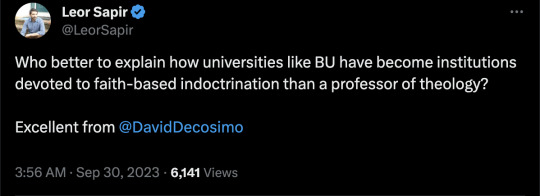
By: David Decosimo
Published: Sep 28, 2023
The debacle that is Boston University’s Center for Antiracist Research is about far more than its founder, Ibram X. Kendi. It is about a university, caught up in cultural hysteria, subordinating itself to ideology.
After suddenly laying off over half his employees last week and with his center producing almost nothing since its founding, Mr. Kendi is now facing an investigation and harsh criticism from numerous colleagues complaining of financial mismanagement, dysfunctional leadership, and failure to honor obligations attached to its millions in grant money.
Such an outcome was entirely predictable. In June 2020, the university hired Mr. Kendi, created and endowed his center, and canceled all “classes, meetings, and events” for a quasi-religious “Day of Collective Engagement” on “Racism and Antiracism, Our Realities and Our Roles,” during which Mr. Kendi and his colleagues were treated as sages.
They denounced voter-identification laws as “an expressly antiblack form of state violence,” claimed Ronald Reagan flooded “black communities with crack cocaine,” and declared that every black person was “literally George Floyd.” One speaker said that decades ago “literal uprising and rebellion in the streets” forced the creation of black-studies programs in universities nationwide, and now was the time to revolutionize the “whole institution” and make antiracism central to every discipline and a requirement for all faculty hiring.
That summer many BU departments published Kendi-ist “antiracist” statements limiting academic freedom and subordinating inquiry to his ideology. With their dean’s oversight and approval, the School of Theatre passed a plan to audit all syllabi, courses and policies to ensure conformity with “an anti-oppression and anti-racist lens” and discussed placing monitors in each class to report violations of antiracist ideology. The sociology department publicly announced that “white supremacy and racism” were “pervasive and woven into . . . our own . . . department.” In the English department’s playwriting program, all syllabi would have to “assign 50% diverse-identifying and marginalized writers,” and any “material or scholarship . . . from a White or Eurocentric lineage” could be taught only “through an actively anti-racist lens.” They even published hiring quotas based on race: “We commit to . . . hiring at least 50% BIPOC”—an acronym for black, indigenous or people of color—“artists by 2023.”
I had recently earned tenure and was serving as a member of BU’s Faculty Council and as chairman of its Academic Freedom Committee. By fall 2020, I was hearing from faculty—all progressives—who were disturbed by what was unfolding in their departments on campus but terrified to speak up. They had seen colleagues face major professional damage for falsely being denounced as racist. I tried to help, but the Academic Freedom Committee had no real power. We could only ask the senior administration to act. It did nothing.
Activist faculty weren’t the only ones transforming BU into an officially Kendi-ist institution. The push was coming from the university’s highest levels. In spring 2020, the Faculty Council had approved a major strategic plan for the university over the next decade. All that remained was a board of trustees vote. Suddenly, a revised plan was presented: Being an “antiracist” institution, with specific reference to Mr. Kendi, was proposed as one of the university’s five main aims.
At a September 2020 Zoom meeting, and with explicit reference to Mr. Kendi’s hire, BU President Robert Brown announced several university wide “antiracist” initiatives, including a task force to examine and expunge racism from BU. A dean claimed the administration would examine not only policies and practices but even ideas—and not only for racism but for whatever might “facilitate racism.”
I pointed out in the meeting that “any notion of ‘antiracism’ presupposes a definition of ‘racism.’ Beyond civil-rights law and common sense, what counts as ‘racism’ is essentially contested and reflective of competing ethical and political views.” I said it sounded as if the university was officially endorsing Mr. Kendi’s views. I asked if his notion of “racism” would guide the BU task force, and I noted that his view that every disparate outcome is caused by and constitutes racism is controversial and rejected by conservatives such as the economist Glenn Loury and progressives such as the Black Marxist Adolph Reed Jr. and my former teacher Cornel West.
Mr. Brown didn’t answer me directly. Immediately, several deans came after me in the chat. I was clearly uninformed and confused; now wasn’t the time for “intellectual debate.” They implied I might not actually oppose racism.
I wrote a letter to BU’s president that afternoon, stressing that beyond the problems with Mr. Kendi’s vision, the more fundamental issue concerned betraying the university’s research and teaching mission by making any ideology institutional orthodoxy. Nothing changed. Even now, BU is insisting it will “absolutely not” step back from its commitment to Mr. Kendi’s antiracism.
Mr. Kendi deserves some blame for the scandal, but the real culprit is institutional and cultural. It’s still unfolding and is far bigger than BU. In 2020, countless universities behaved as BU did. And to this day at universities everywhere, activist faculty and administrators are still quietly working to institutionalize Mr. Kendi’s vision. They have made embracing “diversity, equity and inclusion” a criterion for hiring and tenure, have rewritten disciplinary standards to privilege antiracist ideology, and are discerning ways to circumvent the Supreme Court’s affirmative-action ruling.
Most of those now attacking Mr. Kendi at BU don’t object to his vision. They embrace it. They don’t oppose its establishment in universities. That’s their goal. Their anger isn’t with his ideology’s intellectual and ethical poverty but with his personal failure to use the money and power given to him to institutionalize their vision across American universities, politics and culture.
Whether driven by moral hysteria, cynical careerism or fear of being labeled racist, this violation of scholarly ideals and liberal principles betrays the norms necessary for intellectual life and human flourishing. It courts disaster, at this moment especially, that universities can’t afford.
Mr. Decosimo is an associate professor of theology and ethics at Boston University.
[ Via: https://archive.today/mNXV6 ]
[ Note: this is a longer version of an earlier Tweet thread. ]
==

#David Decosimo#Ibram X. Kendi#Boston University#academic corruption#moral hysteria#corruption of education#ideological capture#ideological corruption#antiracism#antiracism as religion#neoracism#woke#wokeness#wokeness as religion#wokeism#cult of woke#religion is a mental illness#kendi is a racist
5 notes
·
View notes
Text
The first thing to remember about the damage done by the US supreme court this June and the June before is that each majority decision overturns a right that we had won. We had won a measure of student debt relief thanks to the heroic efforts of debt activists since 2011. We had won reproductive rights protection 50 years ago with Roe v Wade, and we won wetlands protection with the Clean Water Act around the same time. We had implemented affirmative action, AKA a redress of centuries of institutionalized inequality, step by step, in many ways over the past 60-plus years. We had won rights for same-sex couples and queer people in a series of laws and decisions.
What this means is that the right wing of the US supreme court is part of a gang of reactionaries engaging in backlash. It also means we can win these things back. It will not be easy, but difficult is not impossible. This does not mean that the decisions are not devastating, and that we should not feel the pain. The old saying “don’t mourn, organize” has always worked better for me as “mourn, but also organize”. Defeat is no reason to stop. Neither is victory a reason to stop when victory is partial or needs to be defended. You can celebrate victories, mourn defeats and keep going.
Each of those victories was hard-won, often by people who began when the rights and protections they sought seemed inconceivable, then unlikely, then remote, and so goes the road of profound change almost every time. To win environmental protections, the public had to be awakened to the interconnectedness, the vulnerability and the value of a healthy natural world and our inseparability from it. To win marriage equality for same-sex couples and equal protection for queer people involved changing beliefs, which was achieved not just by campaigns but by countless LGBTQ+ people courageously making themselves visible and audible in their communities.
To recognize the power of this change requires a historical memory. A memory of rivers catching fire and toxic products being dumped freely in the 1960s. Of laws and guidelines treating queer people as criminal or mentally ill or both in ways that terrorized them and made them largely invisible to the public eye. Of women dying of or damaged by illegal abortions or leading the bleak lives to which unwanted pregnancies consigned them. Of the way the Ivy League universities in particular were virtually all white and all male into the 1970s. Of how inequality was so normalized that first people had to see and believe that women and Bipoc people should have equal rights and access to and a role in the places of power that decide the fate of each of us, the nation and the world. All that changed – not enough, of course, but a lot.
Memory is a superpower, because memory of how these situations changed is a memory of our victories and our power. Each of these victories happened both through the specifics of campaigns to change legislation but also through changing the public imagination. The supreme court can dismantle the legislation but they cannot touch the beliefs and values. We still believe in these rights. We still recognize the harm and the destruction they were meant to prevent. If you didn’t believe that equal access and rights were wrong yesterday or last year, you don’t have to believe it now. Not just because those rights were denied by six justices, at least four of whom are so utterly corrupt in how they got their seats or what they’ve done while seated that they should be forced to resign.
Last year’s attack on reproductive rights has produced its own backlash, with many states working to protect those rights, many elections seemingly pivoting on voter outrage about the Republican party’s brutality toward and hatred of women, and Republicans scurrying away from their own achievement and its hideous impacts. If the Republican party deserves admiration for anything, it’s for their long view, understanding of strategy and tenacity.
The building up of an illicit rightwing supreme court took many years, and took fundamentalist Christians holding their noses to vote for Donald Trump because they understood that meant getting the justices to overturn Roe v Wade. It meant building power from the ground up to take state legislatures to gerrymander electoral maps and sticking vicious clowns like Jim Jordan into bizarrely tailored districts. It meant chipping away at voting rights, achieved in part by the supreme court’s attack on the Voting Rights Act in 2013 and its 2010 Citizens United decision that let a filthy tsunami of corporate dark money into electoral politics, thereby overturning two of its own earlier decisions.
While each of the issues under attack need their own campaigns, voting rights and free and fair elections are crucial to all of them. Don’t forget that the only reason we have such a conservative government, including the supreme court, is voter suppression. If we truly had equal access to the ballot, American voters would choose more progressive candidates and pass more progressive legislation. That’s why what the public wants, believes and values so often differs from what the politicians chosen by dark money and voter suppression give us.
One of the striking features of recent years is the baldfaced Republican effort to prevent Black people in particular, but also young, poor and other non-white demographics from voting. Baldfaced because it acknowledges that they are unpopular and that they’ve given up the goal of being in power because they represent the majority. As they become more marginalized through their own extreme and unpopular views, they have to use more extreme means – now including trying to steal and overturn elections – to hold onto power.
This is as true of climate action as anything else: a new Yale 360 poll shows that “57% of registered voters support a US president declaring global warming a national emergency if Congress does not take further action” and “74% support regulating carbon dioxide as a pollutant.” The problem isn’t the people. It’s the power, and history shows us that when we come together with ferocious commitment to a shared goal we can be more powerful than institutions and governments. The right would like us to feel defeated and powerless. We can feel devastated and still feel powerful or find our power. This is not a time to quit. It’s a time to fight.
Rebecca Solnit is a Guardian US columnist. Her most recent books are Recollections of My Nonexistence and Orwell’s Roses
#Rebecca Solnit#The Guardian#human rights#Corrupt SCOTUS#Opus Dei SCOTUS#civil rights#liberty#justice#rule of law#corruption
3 notes
·
View notes